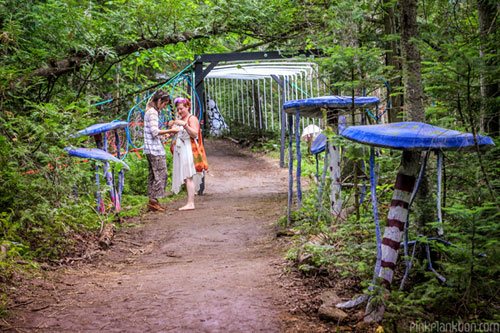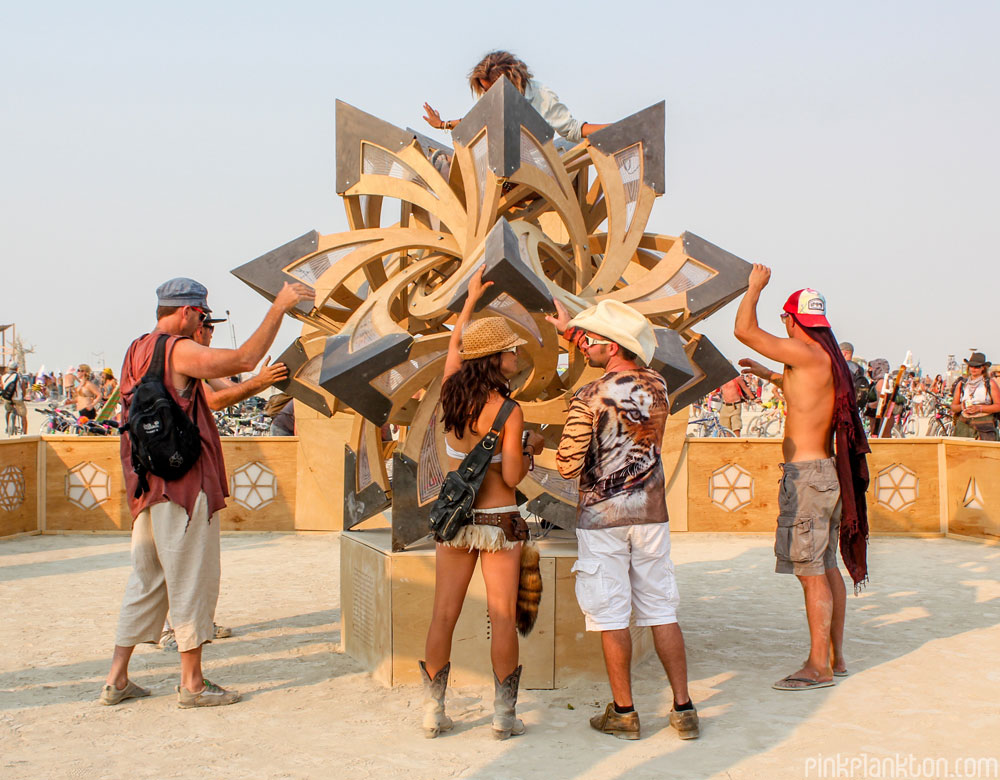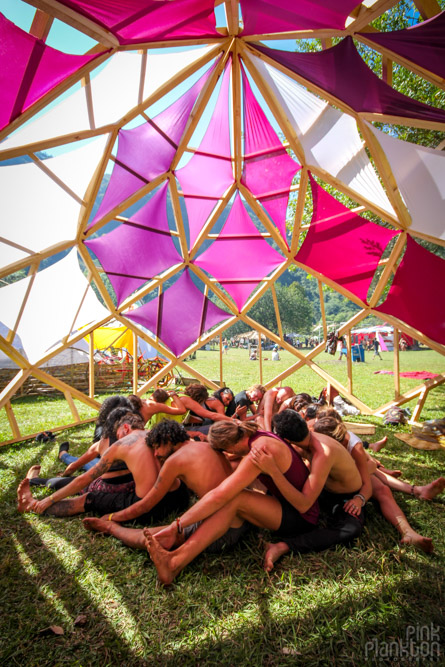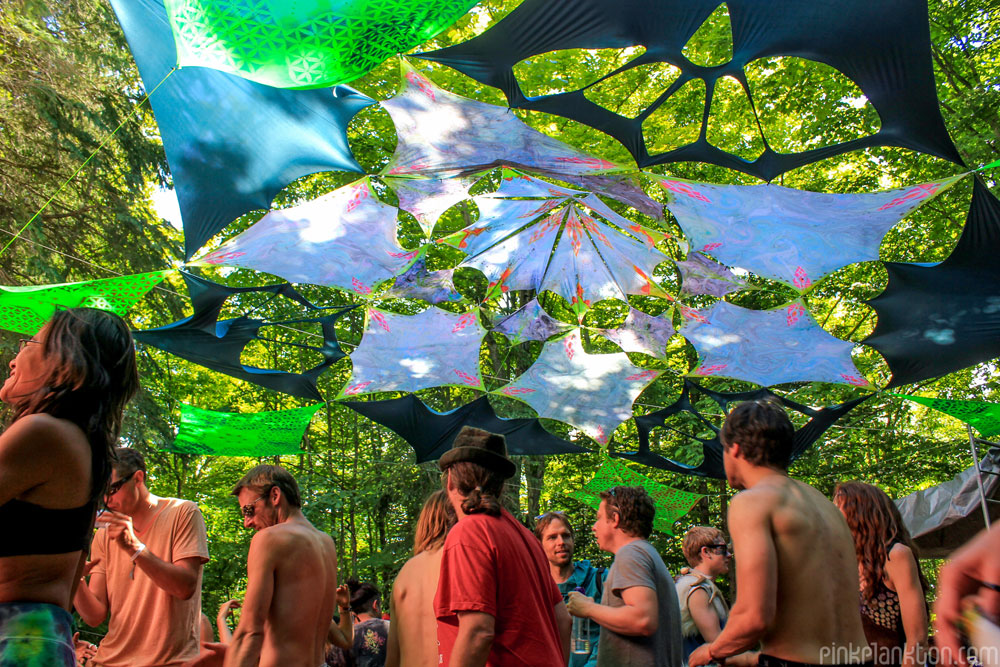Many Burner's call Burning Man 'home'. But why? Watch and find out!
-
-
Every Summer Solstice, the OM Reunion Project co-creates a community-driven gathering of art and music, in a forest in southern Ontario, Canada. It is a great example of a smaller transformational festival that can have just as much impact as any other. This video is only a glimpse into the magical forest that participants help to create for the festival period.
For more information visit omreunionproject.org
-
If you live in the Greater Toronto Area, Veld and Digital Dreams are household names when it comes to summer music festivals. While these types of commercial festivals are a great party, they don't offer the attendee much more than that.
Most aren't aware that there are quite a few alternative, underground festivals, within reasonable driving distance of Toronto. They are known as transformational festivals and they are called that for a reason. You wont see any big names at these festivals, nor will you find that 'mainstream EDM' sound. This is because the main emphasis is not just on the musical lineup; it's also about community, art, and self-expression. Like any commercial festival, they each include stages, music, and dancing, but you will also experience a whole lot more!
1. Solstice Gathering: mid-late June
The Om Reunion Project has been running this week-long festival since 2005. As a result, it is very well organized and there is a strong sense of community present. If there is one festival you make it to this summer, I would recommend this one!
"Om Reunion Project: Solstice is a yearly gathering of creative forces to celebrate the longest day of the year... aimed to inspire creativity and celebrate life. Camp, share, learn, eat, dance, laugh and love. Come with an open mind and dare yourself to pARTicipate in every way you can. We all bring something special, we all volunteer and we all contribute to create something magical."

2. Valhalla Sound Circus: mid-July
Located in Saint-André-Avellin, Quebec, about a 5 hour drive from Toronto, Valhalla Sound Circus is a great way to spend a weekend!
"Valhalla Sound Circus (VSC) is a non-profit cultural event that evokes an environment of free expression by combining a plethora of live musical performances with numerous visual art installations devoted to unifying and strengthening the bass music community. The communitarian spirit helps encourage participants to get to know each other, inspiring people to highlight their individualism while celebrating together."
3. Eclipse Festival: early-August
Eclipse is located in Quebec, just outside of Ottawa. The festival is most well known as a psytrance gathering, but over the years, has expanded to include other forms of electronic music.
"Eclectic programming will include over 20 international artists and 100 North American artists on 3 electronic-music stages (psychedelic trance, techno, and ambient/downtempo/dub) in futuristic decors and immersive visuals. You’ll also find a rest and healing area offering holistic care and a space for workshops and conferences. Come experience new connections, meet new people and share conscious experiences in a parallel universe!"
4. Playground Weekend: mid-August
Playground is a newer and smaller festival, but don't let this discourage you! You don't need a crowd of 50 000 people to have fun. Attending a smaller festival can provide a more intimate experience and a chance to get to know others on a deeper level.
"PLAYGROUND is about music and art, but more importantly it's about the strong community atmosphere and amazing collection of playful individuals."
5. Alweezgrooven: mid-August (although on break for 2018)
Also located in Quebec, just outside of Ottawa, Alweezgrooven is an electronic music, art, and wellness festival that boasts an amazing outdoor location, psychedelic chillout area, total visual experience, workshops (poi, hula hoop, bondage...), Chinese lantern lighting ceremony, healing/recharging (reiki, meditation, yoga...), as well as the expected camping, stages, and amazing music.
6. Harvest Festival: mid-September
Hosted by alienInFlux and Promise, both well known event promoters in the Toronto underground scene, Harvest is always a great way to end off festival season. The festival has been running for over 15 years, and the organizers do an excellent job of providing a fully immersive experience.
"The rolling hills, waters, sculptures and forests of Midlothian Castle is our place to gather and celebrate season’s change by the fire, under the stars and on the dance floor as we kiss summer goodbye."
Whether you are looking to experience something new, or simply wanting to dance to something other than Avicii and Calvin Harris, I highly recommend trying out one of these transformational festivals. I guarantee it will alter your perception of what a festival can be. If you haven't already, please take a look at my post Music Festival vs. Transformational Festival, to learn more. Happy festivaling!
-

Too often do people group music festivals and transformational festivals into the same category. Although there are similarities, there are also some very distinct differences, and these differences can greatly affect ones overall festival experience.
Ever since attending my first festival back in 2011, festival culture has become a large and influential part of my life. I went to Burning Man for the first time and my mind was blown. What I experienced completely changed me and shaped who I am today. Years later, I've attended countless music festivals and transformational festivals. I've seen first hand what makes them very different and feel very passionate about educating other festival-goers about these differences so that they can have more meaningful festival experiences.
History of Festivals
The concept of music festivals dates back to ancient Greece. In essence, a music festival is a series of musical acts or concerts organized around a central theme, most commonly musical genre. Some well known modern day examples are Coachella, Glastonbury, and Tomorrowland.
Over the past couple decades, a new style of festival has emerged. The term transformational festival was coined by Director and Writer Jeet-Kei Leung. He presented the concept to the world at a TEDx Talk in Vancouver in 2010:
In short, a transformational festival can be defined as a counterculture festival that places a strong emphasis on community, personal growth, social responsibility, healthy living, mindfulness, and creative expression (P. Elizabeth, Redefine). Some well known examples of include Burning Man, Boom Festival, and Lightning in a Bottle.
Jeet-Kei Leung also went on to direct and host The Bloom Series, a documentary web-series on the emergence of transformational festival culture. The series is now being evolved into as a 12-part documentary series for television.
There are many elements which distinguish the two types of festivals. I will elaborate on the six which I have found to be the greatest differentiators based on my personal experience:
1. Participant vs. Spectator
The main concept of a music festival is simple: you pay money for a ticket that allows you to see musical artists perform on a stage. You are mainly attending as a spectator. Yes, you can dance, and there may even be other smaller events going on at the festival that you can choose to participate in. But the majority of people who are there have come to see their favorite bands or DJ's play. The focus is on the lineup of performers, not on you.

This is not the case at a transformational festival. Yes, the music, stages, and dancing certainly play a large part, but there is much more emphasis on the other aspects of the festival. Many don’t only attend for the music and dancing. There is often a schedule of workshops that are put on by attendees. There is interactive artwork that was created with participation in mind. In general, if you have any sort of talent, no matter how random it may be, you are free to express it. Attendees are also encouraged to dress however they want, making everyone something to spectate. The fact that everyone is considered a participant truly helps to creates a sense of community.
Of course, some of these aspects apply to music festivals as well. Music festivals today are realizing that festival-goers want more than just the music. They want an immersive experience. This is why more and more music festivals are including participatory elements like interactive artwork and other activities. However, the primary focus continues to be the lineup - the artists that people have come to see play live.
There is something wonderful about walking around a transformational festival and knowing that everything you see - the decor, artwork, stages, lights, lasers, costumes, etc. - has been brought or made by other people just like you, by people who care to contribute to festival. At certain transformational festivals this even includes the musical artists. Some require performing DJ's to buy their ticket and finance their trip. They are not being paid to perform, there is no VIP treatment, DJ's aren't the new rockstars at these festivals, which brings me to my next point...
2. Non-Capitalist Economy
Many music festivals are put on by event corporations. SFX Entertainment is one of the largest. They are responsible for arguably the largest EDM festival today, Tomorrowland, as well as other well known festivals like Electric Zoo and Stereosonic.

These corporations are for-profit businesses. They exist to make money and to grow and expand in order to make even more money. They partner with other companies for mutual benefit. There is most likely a certain brand of alcohol sponsoring a music festival or a certain pop drink. Basically, any company who wants to promote themselves to the festivals demographic will pay the event corporation to setup a brand activation on the festival grounds. "[In 2013], some 447 brands played a role in 300 music festivals worldwide." (M. Sebastian, Advertising Age)
Transformational festivals tend to operate a bit differently. Many of these festivals are grassroots and are organized by non-profit organizations. Some have actually started off simply as gatherings amongst like-minded friends and have expanded over the years into something greater. Many have few full-time staff, if any, and rely heavily on volunteers to keep the festival running year after year. The price of your ticket primarily goes towards renting the land, logistics, maybe a few art grants, and perhaps the salary of a few individuals, but no one is making millions.
Some transformational festivals allow for independent vendors to be present on site. Others operate on a total gifting economy, meaning that nothing is sold at the festival (with a few exceptions, ice and food for example). Everything one can acquire is either traded or given as a gift. This means that all attendees must come prepared with everything they need to survive throughout the festival. Burning Man and other Burner events are the most well-known example of this. Living in a gifting economy was one of the things I found most spectacular at my first Burn. The feeling of a complete stranger coming up to you and handing you a fresh mango, a cold beer, or a handmade necklace, then leading to a fruitful conversation, and possibly a new friendship, it what it's all about. A non-capitalist economy is a breeding ground for genuine human interaction.
3. Workshops and Events
Most music festivals do not offer workshops, as they expect attendees to relax and recover during the day when none of the headlining artists are playing. However, workshops and other events play an integral role in transformational festivals. These can range from almost any topic you can think of, but most often fall into some of these categories:
 spirituality (yoga/meditation, chakra balancing, discussions on new paradigm topics, etc.), performance (hoop lessons, open mic, talent show, etc.), visual art (body painting, friendship bracelet weaving, make your own tutu, etc.), sexuality (BDSM parties, orgasm demos, speed dating, etc.), and completely random (naked Twister, human carwash, etc.)
spirituality (yoga/meditation, chakra balancing, discussions on new paradigm topics, etc.), performance (hoop lessons, open mic, talent show, etc.), visual art (body painting, friendship bracelet weaving, make your own tutu, etc.), sexuality (BDSM parties, orgasm demos, speed dating, etc.), and completely random (naked Twister, human carwash, etc.)The wonderful thing about workshops and events is that they can be put on by anyone, people just like you! This directly correlates to the participant vs. spectator element. Many have an application process or callout for workshop leaders prior to the event. If you have something you are passionate about or would like to see something happen at the festival, you are given the opportunity to make it happen.
Participating in a workshop is a great way to gain some sort of knowledge that you can take back into the real world. It is also a simple way to meet others and have fun! Workshops and events definitely add to the sense of community fostered at transformational festivals.
4. Substance Use and Harm Reduction
This element mainly has to do with North American music festivals. EDM events have been given a bad name lately because of drug-related incidents occurring at music festivals. In 2013, Electric Zoo was cut a day short because two youths overdosed on MDMA and died. There are many more occurrences every summer.
Authorities are responding to these incidents by throwing more police, more searches, and tighter security at music festivals. Simply put, they are responding the wrong way. They are trying to stop drug use all together rather than acknowledging that it is going to happen no matter what. In the US, there are laws in place that discourage event companies from allowing harm reduction groups at festivals. As a result, some festivals "have banned everything from drug-testing kits to to drug information booklets to kandi bracelets in their efforts to not come across as fostering an environment for druggies." (M. Lhooq, Vice) These are exactly the types of tactics that would help prevent negative incidents.
Drug use is integrally weaved into festival culture, whether you like it or not. At Boom Festival, a harm reduction group called Kosmicare puts it best:
In most events across the world, substances are prevalent. The Boom has the responsibility to take care of the Boomers, on site substance testing facilities aim at minimizing the negative effects of substance abuse… never use and abuse. By respecting your body and your mind, you also respect your soul."
 Many transformational festivals share the same philosophy and employ the same tactics that Kosmicare does. For example, free testing, and having a safe space equipped with individuals trained to assist those having a psychedelic crisis. Some also have people volunteering as rangers or vibe patrol. These individuals are identifiable throughout the festival and are able to assist with any incidents they may come across. They are much more approachable than law enforcement would be, to someone with a drug-related issue.
Many transformational festivals share the same philosophy and employ the same tactics that Kosmicare does. For example, free testing, and having a safe space equipped with individuals trained to assist those having a psychedelic crisis. Some also have people volunteering as rangers or vibe patrol. These individuals are identifiable throughout the festival and are able to assist with any incidents they may come across. They are much more approachable than law enforcement would be, to someone with a drug-related issue.One of best example of harm reduction I have witnessed was at Solstice Festival. A safe space called C.A.L.M was setup on the outskirts of the festival for those needing a break from it all, or those having a crisis. Every stage had easily accessible and free water. Vibe patrol was present and would periodically hand out snacks to everyone on the dance floors. And going beyond drug-related harm reduction, there were stations throughout the festival equipped with free gum, sunscreen, bug spray, condoms, an emergency walkie-talkie… basically everything a festival-goer would need.
In general, some music festivals tend to give off a "let's get FUCKED UP" vibe - a mentality that leads to attendees not caring about what they are ingesting or how much they are ingesting, which then leads to negative drug-related incidents. Transformational festivals are about more than just "getting fucked up".
5. Leave No Trace
Leave No Trace is a set of principles that promote environmental conservation and sustainability. In a festival context, it basically means clean up after yourself.

Transformational festivals generally encourage attendees to respect the land that the event is held on. Because many are organized on a grassroots level, no one may be getting paid to clean up afterwards. Encouraging the leave no trace policy is the best and easiest way for clean up to occur.
The image to the right was taken at Glastonbury Festival in 2014. The grounds are often left looking like a garbage dump. Most music festivals do not encourage leave no trace. And if they do, it is widely ignored. Festival-goers paying large amounts of money for their ticket expect someone to clean up after them. Festival organizers know this and thus a cleanup crew is employed... which is fine, if it works for them.
However, I feel that leave no trace adds to the sense of community that is more prevalent at transformational festivals. If you encourage the fact that everyone is a participant, that everyone has something to contribute, that we are all in this together, attendees are more likely to help do their part at the end.
6. General people vibe
This is perhaps the most important factor for me personally and also the most subjective. Generally, I find the types of people who attend transformational festivals easier to connect with. They are friendlier, more loving, caring, and open. This attitude helps sets the tone of the festival.
I am not saying people who I have met at music festivals are not all of the above. And I am certainly not saying that everyone at transformational festivals fits the bill. But overall, I have found the crowds at transformational festivals different than at your average music festival. And it’s not hard to understand why. Many people come to these events looking for more than just a party or a hedonistic escape. They come looking to connect with others and with themselves on a deeper level. The come with intention, they come to create. But a lot of them also come to party. It's all about balance. At a transformational festival you are more likely to find those who are there for a wider range of reasons.
Below is a film I shot at several different transformational festivals over several years. I hope the visuals and interviews with attendees help to better illustrate the points above.
There are many other factors which differentiate the two types of festivals. These are merely the six I find most distinguishable based on my personal experiences. Am I saying a music festival cannot be transformational, or a transformational festival cannot be musical? No. There is certainly a grey area; many festivals are gradually blurring the lines between the two. Is one type of festival better than the other? That is up to you to decide. If you want to go see your favorite artists perform, dance, and party, then there is nothing wrong with attending a music festival. However, transformational festivals are called that for a reason. The combination of the above factors, and the sense of community that they help foster, sets these types of festivals apart. The transformation is truly something you must experience for yourself.
Regardless, the single most important factor in any festival experience is YOU - your attitude, your thoughts, and your decisions. Happy festivaling!
-
Although, no video can ever even come close...